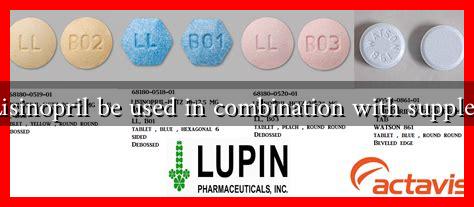-
Table of Contents
Can Lisinopril Be Used in Combination with Supplements?
Lisinopril is a widely prescribed medication belonging to the class of drugs known as ACE inhibitors. It is primarily used to treat high blood pressure and heart failure, and it can also help protect the kidneys in patients with diabetes. As more individuals seek to enhance their health through dietary supplements, a common question arises: Can Lisinopril be safely combined with these supplements? This article explores the potential interactions, benefits, and considerations of using Lisinopril alongside various supplements.
Understanding Lisinopril
Lisinopril works by inhibiting the angiotensin-converting enzyme (ACE), which plays a crucial role in the body’s blood pressure regulation. By blocking this enzyme, Lisinopril helps relax blood vessels, making it easier for the heart to pump blood. It is essential for patients to understand how this medication interacts with other substances, including dietary supplements.
Common Supplements and Their Interactions with Lisinopril
While many supplements can offer health benefits, some may interact negatively with Lisinopril. Here are some common supplements and their potential interactions:
- Potassium Supplements: Lisinopril can increase potassium levels in the blood. Taking potassium supplements or consuming high-potassium foods (like bananas and oranges) can lead to hyperkalemia, a condition characterized by dangerously high potassium levels.
- Magnesium Supplements: Magnesium can help lower blood pressure, which may complement the effects of Lisinopril. However, excessive magnesium intake can lead to adverse effects, especially in patients with kidney issues.
- Coenzyme Q10 (CoQ10): Some studies suggest that CoQ10 may help lower blood pressure and improve heart health. While it is generally considered safe, patients should consult their healthcare provider before combining it with Lisinopril.
- Fish Oil: Omega-3 fatty acids found in fish oil can have cardiovascular benefits. Research indicates that fish oil may enhance the effects of blood pressure medications, including Lisinopril, but should be taken under medical supervision.
Case Studies and Research Findings
Research on the interactions between Lisinopril and dietary supplements is still evolving. A study published in the Journal of Hypertension found that patients taking Lisinopril alongside CoQ10 experienced improved blood pressure control compared to those on Lisinopril alone. However, the study emphasized the importance of medical supervision when combining supplements with prescription medications.
Another study highlighted the risks associated with potassium supplementation in patients taking Lisinopril. The research indicated that patients who consumed potassium-rich supplements were at a higher risk of developing hyperkalemia, leading to serious health complications.
Consulting Healthcare Professionals
Before adding any supplements to a regimen that includes Lisinopril, it is crucial to consult with a healthcare professional. They can provide personalized advice based on individual health conditions, current medications, and overall treatment goals. Here are some tips for discussing supplements with your healthcare provider:
- Be honest about all supplements you are currently taking.
- Discuss any health conditions or concerns you may have.
- Ask about potential interactions and side effects.
- Inquire about the appropriate dosages for any recommended supplements.
Conclusion
In summary, while Lisinopril can be an effective treatment for high blood pressure and heart failure, caution is necessary when considering the use of dietary supplements. Some supplements may enhance the effects of Lisinopril, while others can lead to harmful interactions. It is essential for patients to engage in open communication with their healthcare providers to ensure safe and effective treatment plans. By doing so, individuals can make informed decisions about their health and potentially benefit from the synergistic effects of supplements and medications.


